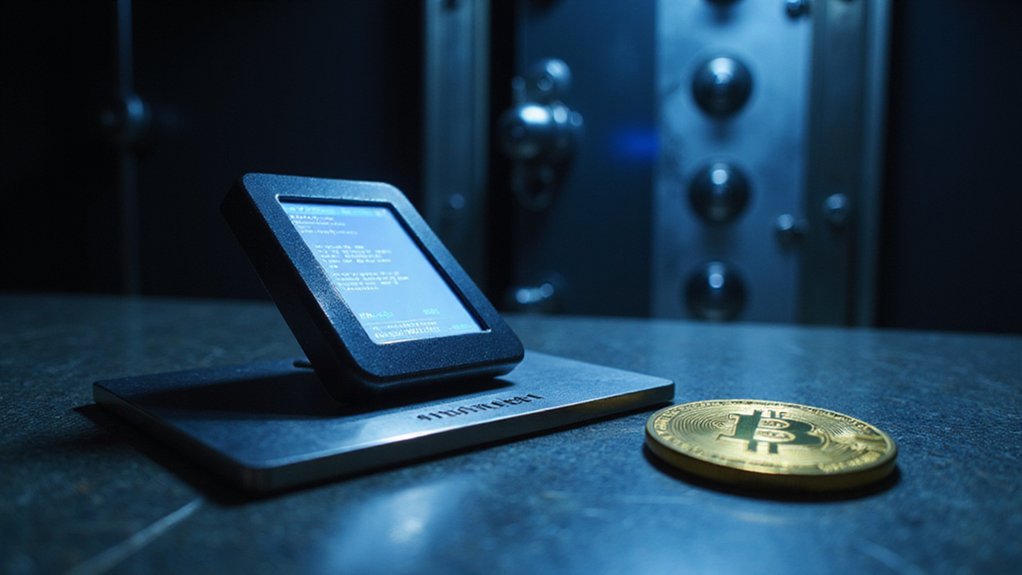A smart wallet represents the evolution of traditional billfolds, merging physical storage with digital technology. These devices—often crafted from aerospace-grade materials like aluminum or carbon fiber—offer RFID-blocking protection, GPS tracking, and rapid card-access mechanisms that eliminate checkout fumbling. Beyond mere storage, advanced models incorporate cryptocurrency functionality, biometric authentication, and transaction monitoring. For those weary of wallet catastrophes (lost, stolen, soaked), these intelligent accessories transform financial management from necessary nuisance to seamless experience. Further exploration reveals surprising benefits beyond mere convenience.

The humble wallet, once a mere repository for cash and cards, has undergone a remarkable metamorphosis in the digital age.
Smart wallets represent the convergence of traditional functionality with cutting-edge technology, offering solutions to age-old concerns like theft and loss while introducing capabilities previously confined to science fiction.
These modern marvels integrate RFID-blocking technology to thwart electronic pickpocketing—a necessity in an era where digital information has become as valuable as the currency it represents.
Constructed from materials one might expect to find in aerospace applications (aluminum and carbon fiber come to mind), smart wallets prioritize durability without sacrificing aesthetic appeal.
Their minimalist design belies their sophisticated functionality; many feature GPS or Bluetooth tracking capabilities, transforming the once-dreaded wallet misplacement into a minor inconvenience rather than a day-derailing catastrophe.
The user experience has been thoughtfully reimagined, with mechanisms facilitating rapid card access—pop-up cards and trigger systems that eliminate the ungainly wallet-fumbling ritual at checkout counters worldwide. Users consistently praise the seamless card access that makes transactions faster and more efficient at the point of sale.
Water resistance and scratch-resistant properties further enhance longevity, ensuring these accessories remain functional and presentable through years of daily use.
Many premium models incorporate mechanical card arms that securely hold and present cards at the perfect angle for easy retrieval when needed.
For cryptocurrency enthusiasts, digital smart wallets offer an impressive array of features: multi-factor authentication (often including biometric verification), automated execution of smart contracts, and dynamic gas fee management to optimize transaction costs.
The capacity to batch transactions and support cross-chain operations demonstrates remarkable versatility, while integration with decentralized applications extends utility beyond mere storage.
Web3 wallets specifically provide users with complete control over their private keys and digital assets, enabling truly decentralized financial management without intermediaries.
Perhaps most compelling is how smart wallets simultaneously address security concerns and enhance convenience.
Real-time balance updates, transaction history tracking, and automated recurring payments streamline financial management, while advanced encryption protocols safeguard sensitive information.
Multi-cryptocurrency support within a single interface eliminates the need for multiple platforms, centralizing control while, paradoxically, embracing decentralization principles.
The smart wallet, thus, represents not merely an incremental improvement over its predecessor but a fundamental reimagining of how we interact with our finances—both physical and digital—in an increasingly complex economic landscape.
Frequently Asked Questions
How Do Smart Wallets Protect Against Unauthorized Access?
Smart wallets employ multi-layered security protocols to thwart unauthorized access.
They leverage biometric authentication (fingerprints, facial recognition) combined with PINs, creating formidable multi-factor barriers.
Additionally, behavioral analytics monitor for suspicious activities, assigning risk points that trigger access restrictions when thresholds are exceeded.
The implementation of strong encryption standards (AES-256) protects sensitive data, while continuous transaction monitoring and regular security updates close potential vulnerabilities.
These sophisticated systems render traditional hacking methods largely ineffectual against well-designed smart wallet architecture.
Can Smart Wallets Work Offline?
Smart wallets fundamentally operate offline in their primary function—storing physical cards and cash.
While they lack the sophisticated offline digital payment capabilities found in certain eWallets (which employ secure tokens and preloaded balances), some models do feature offline tracking devices that, ironically, require eventual synchronization with connected devices.
The wallet’s core functionality—accessing physical items—remains blissfully untethered from the digital domain, making them particularly resilient in connectivity-challenged environments where their electronic counterparts might falter.
What Happens if I Lose My Device With a Smart Wallet?
Losing a device containing a smart wallet triggers a cascade of potential problems: immediate loss of access to funds and services, risk of unauthorized access if security measures are inadequate, and the inconvenience of recovery procedures.
Fortunately, many smart wallets incorporate tracking features to aid recovery.
Users should preemptively enable biometric authentication, complex passwords, and remote wipe capabilities—while maintaining regular backups to mitigate the financial disruption that inevitably accompanies such a loss.
Are Smart Wallets Compatible With All Cryptocurrencies?
Smart wallets aren’t universally compatible with all cryptocurrencies.
While they excel with EVM-compatible chains (Ethereum, Polygon, Arbitrum, etc.) and their associated tokens, support for non-EVM networks like Bitcoin is particularly limited.
Coinbase and similar smart wallets support thousands of assets across multiple chains, but cryptocurrencies like BCH or XRP may require alternative solutions.
The compatibility landscape continues evolving, with wallet providers regularly expanding their supported networks and assets—though universal coverage remains elusive.
How Much Do Smart Wallets Typically Cost?
Smart wallets typically cost between $50 and $100, positioning them well above traditional wallets ($5-$20) yet surprisingly competitive with luxury leather offerings.
The price reflects integrated technology—Bluetooth tracking, RFID protection—and premium materials like aluminum, carbon fiber, or high-grade leather.
While this represents substantial markup over conventional alternatives (one might reasonably question whether location-tracking justifies a 500% premium), market positioning suggests manufacturers have strategically priced these devices at the intersection of technology and fashion accessories.









